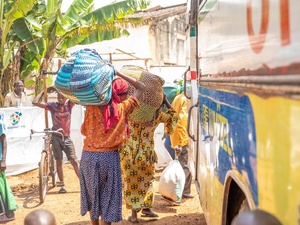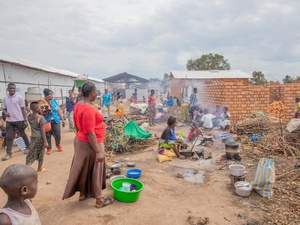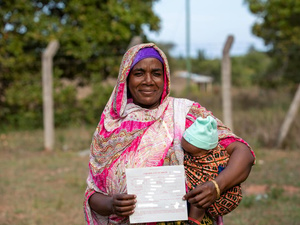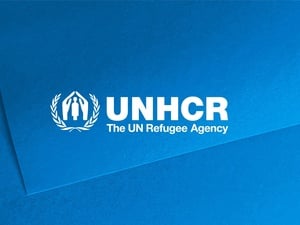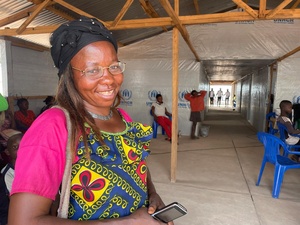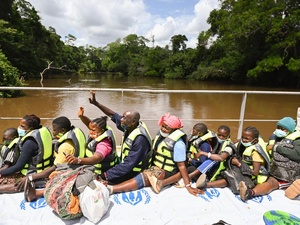End of refugee status for Angolan and Liberian exiles this weekend
End of refugee status for Angolan and Liberian exiles this weekend
This weekend, two of the most protracted refugee situations in Africa will finally come to an end. On June 30, cessation clauses will enter into force for refugees from Liberia and Angola on the basis that these countries have both enjoyed many years of peace and stability after bitter civil wars.
This means people who fled the two countries and remain abroad will no longer be regarded as refugees by UNHCR and host governments. We are working with the governments of origin and of asylum to find solutions for those refugees who wish either to return home or to remain in their host countries due to strong ties there. Voluntary returns will continue to be assisted while possibilities for local integration and/or an alternative legal status are also being discussed.
In Liberia, the ending of refugee status will apply to people who left the country during the two civil wars that tore apart the country between 1989 and 2003, killing more than 250,000 people and forcing some 750,000 to flee their homes and find shelter elsewhere in Liberia or abroad.
Voluntary repatriation to Liberia was launched in 2004, since when UNHCR has helped almost 135,000 people return to Liberia, including more than 8,500 this year. This is higher than the figures for 2010 (1,278) and 2011 (1,762), and appears to have been prompted by the announcement in January that refugee status would end on June 30. Many others have gone back to Liberia on their own accord, mostly from other West Africa countries.
A further 16,641 Liberian refugees have registered to return home and will be repatriated by UNHCR over the coming weeks. The refugees are returning mainly from Côte d'Ivoire, Ghana, Guinea and Nigeria. Smaller groups are also coming back from the Gambia, Guinea-Bissau, Mali, Senegal and Sierra Leone. Most have been repatriated by air or land routes.
Liberian refugees who wish to remain in the country of asylum will have to meet the necessary legal requirements of that country, for example for long-term or permanent residence. UNHCR and its government partners have been working to help people in this situation. Thanks to the ECOWAS Protocol on Freedom of Movement all ECOWAS citizens, including former Liberian refugees, have the right to reside and establish themselves as well as work in any ECOWAS country.
UNHCR is also supporting integration for these people through livelihood projects and training and is ensuring they have access to education and health facilities. About 12,300 Liberians in exile for more than 20 years recently reconfirmed their desire to locally integrate.
In Angola, the ending of refugee status will apply to those who fled that country during the 1965-75 war of independence from Portugal and the subsequent civil war, which ended in 2002. Last year, UNHCR and the Government of Angola launched a new organized return programme for Angolan refugees in neighbouring countries. Nearly 23,000 Angolans have returned to their country since this programme began, including more than 17,000 who have repatriated to Angola's Uige and Zaire provinces from the west and south-east of the Democratic Republic of the Congo (DRC). A final convoy from the Democratic Republic of the Congo, carrying more than 1,000 people is due to reach Angola today.
The repatriation programme has been ramped up in recent weeks in DRC and other countries, such as Namibia (2,465 returns this year), Zambia (755), Botswana and Republic of Congo, but has been hampered by logistical problems, funding issues and bad weather conditions, which have damaged bridges and made road conditions difficult.
A further 26,000 Angolan refugees have confirmed their intention to return home from DRC. Although organized returns will close on June 30, we will continue to assist return for those who want to go back. Meanwhile, we are also discussing with host countries local integration options for people who do not wish to return to Angola. In the DRC some 51,000 people have said they do not want to repatriate and they have been invited to register with the DRC government's National Refugee Commission, with a deadline of today. The Government of Zambia has offered to locally integrate up to 10,000 Angolan refugees, with international support.
UNHCR has, meanwhile, been supporting projects in both countries aimed at easing the reintegration of the returnees. In Liberia, returnees have been given cash grants to help them get to their places of origin and to help rebuild their lives. Some people have attended UNHCR supported skills training programmes.
Refugees with protection concerns about returning to Liberia or Angola have the option to ask for an exemption to cessation. If approved by the authorities in their host country, they will maintain their refugee status.
For more information on this topic, please contact:
- Angolan cessation: In Pretoria (Regional) Tina Ghelli on mobile +27 827 70 41 89
- Liberian cessation: In Dakar (Regional) Hélène Caux on mobile +221 77 333 12 91
- In Geneva, Leo Dobbs on mobile: +41 79 883 6347


